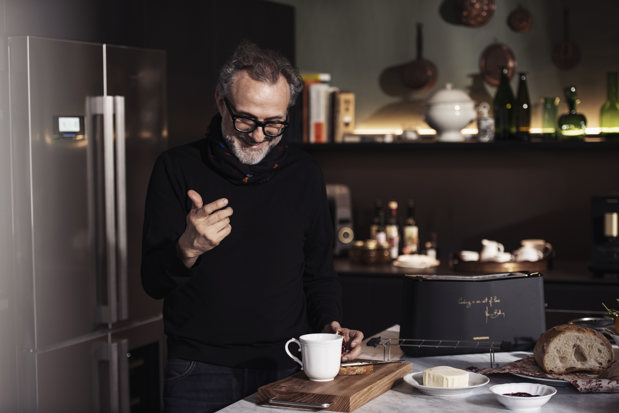CHEF MASSIMO BOTTURA BECOMES UNEP GOODWILL AMBASSADOR
The 29th of September marked the International Day of Awareness of Food Loss and Waste. This important day stresses that food waste places unnecessary pressure on our natural resources; depleting them and generating greenhouse gases which negatively affect the climate and biodiversity.
Food loss and waste is responsible for about 8% of global greenhouse gas emissions. Reducing the level of waste is one of the most effective ways in which individuals, businesses and governments can reduce their impact on our climate.
Here are some key facts on food waste that help to illustrate the scale of the problem:
-
Roughly one third of the food produced that is intended for human consumption - about 1.3 billion tons and worth USD$1 trillion - is wasted or lost every year. That’s enough to feed 3 billion people.
-
25% of the world’s freshwater supply is used to grow food that is never eaten.
-
Annual per capita waste by consumers is between 95-115kgs a year for Europeans and North Americans, while in south and south-eastern Asia, it is 6-11kgs.
-
At the retail level, large quantities of food are wasted because of quality standards that over emphasise appearance. In fact, half of all produce is thrown away in the US because it is deemed too “ugly” to eat; this amounts to 60 million tons of fruits and vegetables.
-
According to a survey conducted by Respect Food, 63% of people don’t know the difference between “use by” and “best before” dates. Foods with “use by” dates are perishable and must be eaten before the given date. Foods with “best before” dates can be eaten after the given date but it won’t be at its best quality.
-
Crops are sometimes left unharvested because they do not meet supermarket quality, which is often determined by appearance.
-
In Europe, 40-60% of fish caught are discarded because they do not meet supermarket quality standards.
Grundig’s Respect Food Initiative works to inspire everyone in the fight against food waste. The brand is introducing solutions to tackle waste in kitchens with innovative products and encouraging everyone to treat food with care and attention.
During COVID-19, Grundig’s "It starts at home" motto was replaced by "Let’s stay at home" campaign, led by Massimo Bottura, a chef patron and a social entrepreneur who is committed to fighting food waste and social isolation, especially amidst the pandemic. Using the power of social media and technology the campaign has been providing action tips that people can take at home.

We are extremely proud of our long standing partnership with Massimo, who was recently appointed by the UN Environment Program (UNEP) as a Goodwill Ambassador. His appointment on the International Day of Awareness of Food Loss and Waste intends to send a message to inspire a change of mind-set and show that it starts at home, in our kitchens. “There is no room for food loss and waste, especially as millions across the world go hungry,” said Inger Andersen, Executive Director of UNEP. She also added; “The pandemic is a wake-up call reminding us of the urgent need to transform our relationship with nature and in particular, rethink the way we produce and consume food. I am delighted that Massimo Bottura, who is already making a difference through his Refettorios, is joining forces with UNEP to help bring real change.”
“If we can use all of the ingredients to the fullest potential and shop more efficiently, we will reduce the amount of waste we are creating,” Bottura added. “In my role as UNEP Goodwill Ambassador, I will fight to reduce this global issue.”
Bottura noted that we all must start asking and understanding where our food comes from, taking action to preserve food memories and techniques that can help us innovate for the future and take care not to repeat practices and consumption behaviours that have caused the challenges in our food system today. He adds that the act of cooking – as well as that of feeding oneself – must become an ethical choice, not just a question of taste.

 EN
EN  TR
TR
Share